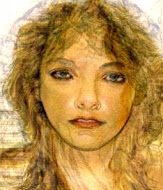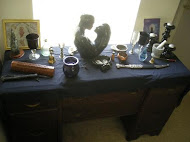Author: Bia' Aletheia
Posted: January 11th. 2009
Dream Magic not only encompasses dream interpretation but it helps the dreamer to understand his or her personal symbols and messages that are being revealed to them in an altered state. It has been argued by many scientists, philosophers and people from various cultural perspectives that dreams are indeed messages from the Gods or spirit guides. These gods or guides are trying to reveal a much-needed path that should be taken, or things we may need to change to achieve spiritual growth. Often ‘journeying or astral travel’ occurs in the realm of dreams.
Dream Magic is the ability to manipulate our dreaming in order to fulfill some specific goal or intent. It is much like that of performing a magic/ spell, which has to have a goal in mind. Dream Magic can be used for many purposes, to achieve certain goals like prophecy, predict the future or communicate with the Gods and/or spirit guides.
Dream Magic can be used to communicate with loved ones passed on or help us become more in tune with our ‘inner desires’, referred to as our shadows. It is another method of seeking answers to specific questions we may have. Dream Magic can be used for healing and transformation. Because dreams can reveal so much to us, learning how to interpret them is very important.
Actual dream interpretations dates back to 3000-4000 B.C., where they were documented in clay
tablets. It is said that people in primal societies were unable to distinguish between the dream world and reality. They not only saw the dream world as an extension of reality, but the dream realm was a more powerful world.
Back in the Greek and Roman era, dream interpreters accompanied military leaders into battle. Dreams were extremely significant and often seen as messages from the gods. They were seen in a religious context and in Egypt, priests also acted as dream interpreters. The Egyptians recorded their dreams in hieroglyphics. People with particularly vivid and significant dreams were believed to be blessed and were considered special. People who had the power to interpret dreams were looked up to and seen as divinely gifted. In the bible, there are over seven hundred mentions of dreams. Tracing back to these ancient cultures, people had always had an inclination to interpret dreams.
Dreams were also seen as prophetic. People often looked to their dreams for signs of warning and advice. It was an oracle or omen from outside spirits, whether it was a message from a deity, from the dead or even the works of a demon. Dreams often dictated the actions of political and military leaders and aided in diagnosis for the medicine men. Dreams were a vital clue for healers in what was wrong with the dreamer and they used them to make a diagnosis. People in ancient Greece and ancient China looked to their dreams for their next course of action [1].
Dreaming can be seen as an actual place that your spirit and soul leaves every night to go and visit. The Chinese believed that the soul leaves the body to go into this world. However, if they should be suddenly awakened, their soul may fail to return to the body. For this reason, some Chinese today, are wary of alarm clocks.
Some Native American tribes and Mexican civilizations share this same notion of a distinct dream dimension. They believed that their ancestors lived in their dreams and take on non-human forms like plants. They see that dreams are a way of visiting and having contact with their ancestors. Dreams also helped to point their mission or role in life.
In the early 19th century, dreams were dismissed as stemming from anxiety, a household noise or even indigestion. Hence there was really no meaning to it. Later on in the 19th century, Sigmund Freud revived the importance of dreams and its significance and need for interpretation. He revolutionized the study of dreams. Dreams have long exercised a fascination over the human imaginations. So what are dreams? And more importantly what significance, if any, do they have for the dreamer [2].
As early as the fourth century B.C. Chuang-tzu, a Chinese philosopher, raised the following point regarding dream significance:
“While men are dreaming, they do not perceive that it is a dream. Some will have a dream in a dream, and only when they awake they know it was all a dream. And so, when the Great Awakening comes upon us, shall we know this life to be a great dream. Fools believe themselves to be awake now.
Once upon a time, I Chuang-tzu, dreamed I was a butterfly, fluttering hither and thither, to all intents and purposes a butterfly. I was conscious only of following my fancies as a butterfly, and was unconscious of my individuality as a butterfly. Suddenly I was awakened, and there I lay myself again. Now I do not know whether I was a man dreaming I was a butterfly, or whether I am a butterfly now dreaming I am a man”.
This brings up the interesting notion that perhaps the world as we ordinarily experience it is no more real than a dream.
Dreams often seem to be experiences of a confused parallel world. Reflecting on this experience, we may speculate that during dreams we travel to a real, alternate realm. It has been suggested that one of the principle sources of this idea - a spiritual world distinct from the physical - is a dream. If this hypothesis is true, even partially then dreams contribute to one of the basic notions of religion. It has also been hypothesized that dreams may be linked to the idea of a soul distinct from the body. During dreams, we have the experience of traveling to other realms, interacting with people, and doing various things - simultaneously, the physical body remains confined to our beds. While the dream realm is shadowy and even surreal, it nevertheless feels like a real place. Because the experience is so real, it easy to speculate that during dreams the conscious self somehow separates from the body. If we add to this the common experience of meeting departed friends and relatives in dreams, it is no great step to conclude that the same “soul” that separates from the body during dreams also survives the death of the body.
Yet another broad area of agreement among world cultures is that of communicating between this world and the other world - between gods and mortals, or between the living and the dead - is possible. Prophets, as well as the founders of new religious sects, often claim to receive privileged communications from the gods. If dreams constitute experiences with the realm of the spirit, then one possible model for divine - human communication is the dream state.
The New Age movement, which began in the late 1950’s, has also delved onto several aspects of dreams in contemporary culture. For example, new dream dictionaries, containing interpretations of specific dream images and symbols have been composed to aid in dream meaning exploration. Dream tools have also been developed or fine tuned with this emergence, to assist in transformation and healing. More specifically with a growing interest of lucid dreaming, the practice of becoming conscious during one’s dreams and learning to control their directions is viewed as a potential tool for healing and self-transformation.
Before we delve into the specifics on how to use Dream Magic it is pretty significant to discuss some cultural perspectives of dream lore so we may examine how Dream Magic evolved cross-culturally [3].
Babylonians: The Babylonians divided dreams into two categories. They believed the Gods sent good dreams. Bad dreams were sent by Demons. Their Goddess of dreams was Mamu.
Assyrians: The Assyrians believed in dreams as omens. For example, if a person flew in their dreams it indicated all would be lost.
Egyptians: The Egyptians believed that the Gods showed themselves in dreams. The Egyptians believed dreams were based on real things. The recording of dreams in Egypt may be traced back to 2000 B.C., where the Egyptians wrote their dreams on papyrus. They believed there were three main types of dreams. Those that happened as a result of ritual, dreams that contained warnings or dreams that were the Gods were demanding some type of action.
Greeks: When a person was sick a Priest would interpret the dream and then give advice on healing. They believed the Gods sent dreams. The Gods also sent prophecies to those who slept at shrines. The Greeks thought that the people in their dreams lived near the underworld.
Romans: The Romans had strong views on dreams. They believed dreams were messages from the Gods. Emperor Augustus ruled that anyone who had a dream about the state must proclaim it in the market place.
Hebrews: Hebrews believed their dreams were the voice of only one God; however bad dreams were the work of Demons. The Hebrews incubated dreams in order to receive divine revelation.
Hindus: The time when a prophetic dream occurred indicated when the event would take place.
Japanese: The Emperor’s palace contained a dream hall with an incubation bed. Japanese Emperors also incubated their dreams at a Shinto Temple at Usa on the southern island of Kyushu.
Muslims: In Mohammed’s sacred book a distinction is made between true dreams from God and false dreams. Rituals were used to create good dreams. Later on dream interpretation became associated with astrology.
Many Indian Tribes believed that dreams revealed the hidden wishes of the soul. I have included in this section, since we are discussing ‘Dream Lore’ culturally, different Tribes beliefs’ on Dreams for those who how are also interested in Shamanism [4].
The Cree: They regard dreams as a source of creative inspiration and spiritual guidance and it serves to connect with ordinary daily activities. For example, to dream of meeting a stranger of the opposite sex actually is a metaphor for what will occur during a hunt for a game animal.
The Hopi: Hopi society conveys much of its religious and recreational experience through a rich imagery derived from dramatic rituals that are frequently translated in dreams. Dreams are viewed as an attempt by the self to make statements about the individual’s present situation. The Hopi believe good dreams have to be held in the heart and can be told only after they are fulfilled, however, bad dreams need to be discussed because reporting them eliminates them.
The Iroquois: They believe that human souls have desires that are inborn and concealed and come from the depths of the soul. The soul makes these natural desires known by means of dreams. The Iroquois often rely on a ‘dream specialist’ to help interpret their dreams. A dream can reveal not only the wishes of the dreamer but also the desires of supernatural beings. The frustration of these desires may be dangerous, in that they can cause death of the dreamer or bring disaster.
The Navajo: Dreams to them are not discussed openly; they are regarded as warnings. Dream specialists are also consulted by them to discuss the cause of the dream. The diagnostician, often in a trance state, not only will discover the cause of the dream but will also reveal the dreamer’s sickness. Praying at sunrise is a ritual used to dispel bad dreams. If a Navajo dreams that he is dead, he interprets the meaning as he has just visited the spirit world of the dead. If the dreamer shakes hands with the dead it is believed to be an omen of death to the dreamer…
View the rest of the article here on Witchvox
Disclaimer: No one involved in this blog or its contents may be held responsible for any adverse reactions arising from following any of the instructions / recipes on this list. It is the reader's personal responsibility to exercise all precautions and use his or her own discretion if following any instructions or advice from this blog















No comments:
Post a Comment